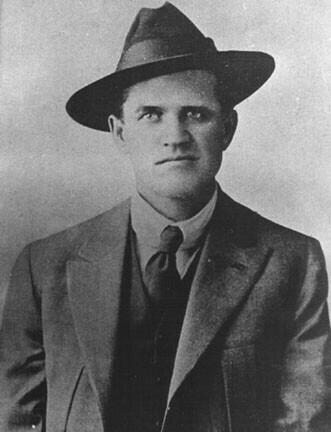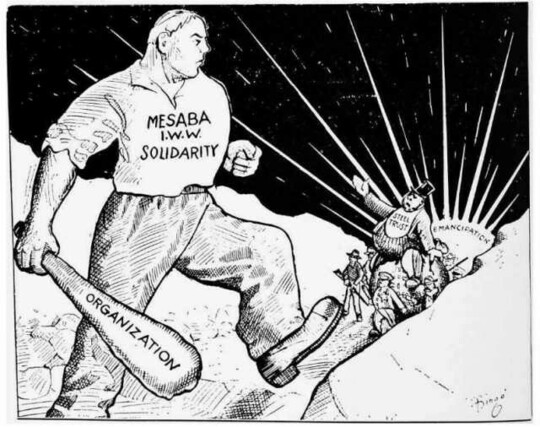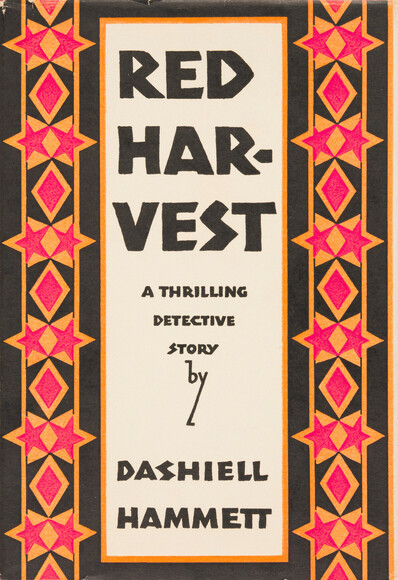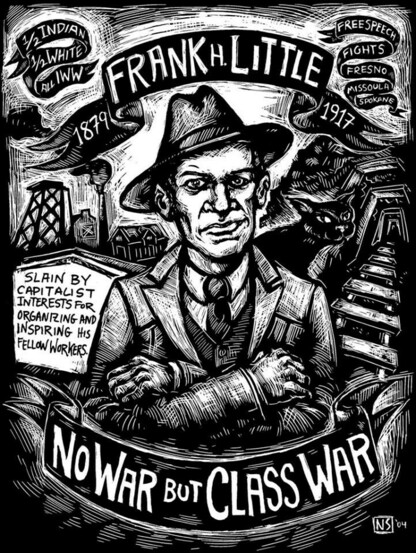MikeDunnAuthor · @MikeDunnAuthor
1850 followers · 3933 posts · Server kolektiva.socialToday in Labor History August 20, 1909: The Industrial Workers of the World (IWW) was engaged in a free-speech fight in Fresno, California, over the right to organize workers from street corners. Native American, Frank Little, led the fight, and the drive to organize local agricultural workers, including African Americans and immigrants from China and Latin America. Little, was lynched in 1917, during a labor struggle in Montana.
#WorkingClass #LaborHistory #IWW #FrankLittle #FreeSpeech #fresno #NativeAmerican #indigenous #immigration
#workingclass #LaborHistory #IWW #franklittle #freespeech #fresno #nativeamerican #indigenous #immigration
MikeDunnAuthor · @MikeDunnAuthor
1305 followers · 2936 posts · Server kolektiva.socialToday in Labor History June 1, 1916: The predominantly immigrant iron miners of the Mesabi Range, Minnesota, participated in a seemingly spontaneous strike in response to expensive housing and goods, long hours and poor pay. The group was led by radical Finns who quickly drew the attention and aid of IWW organizers. Wobbly organizers, including Carlo Tresca, Joe Schmidt, Frank Little, and later Joe Ettor and Elizabeth Gurley Flynn came to help local strike leaders draw up a list of demands which included an 8-hour day timed from when workers entered the mine until they were outside; a pay-scale based upon the day worked; pay-days twice monthly; immediate back-pay for hours worked upon severance; abolition of the Saturday night shift; abolition of the hated contract mining system. In the Contract Mining system, the bosses hired and paid “skilled” miners to do most of the mining. The contract miners then had to hire their own laborers and pay them out of their meagre wages. The contract miners were often native-born people, while the laborers were often immigrants. This created a racialized two-tiered system that divided the workers and made it harder to organize. The bosses would routinely offer the contract miners a minor concession to get them back to work, while offering the even more poorly paid laborers nothing, destroying their solidarity and ending the strike.
#WorkingClass #LaborHistory #IWW #union #strike #wildcat #Mesabi #iron #mining #solidarity #immigrant #ElizabethGurleyFlynn #FrankLittle #racism
#workingclass #LaborHistory #IWW #union #strike #wildcat #mesabi #iron #mining #solidarity #immigrant #elizabethgurleyflynn #franklittle #racism
MikeDunnAuthor · @MikeDunnAuthor
1305 followers · 2937 posts · Server kolektiva.socialToday in Writing History May 27, 1894: Author Dashiell Hammett was born. From the age of 21-23, he worked as a Pinkerton detective and then joined the army. But he developed tuberculosis and was discharged shortly after joining. In 1920, he moved to Spokane, again to work for the Pinkertons. There, he served as a strikebreaker in the Anaconda miners’ strike. However, when the Pinkertons enlisted him to assassinate Native American IWW organizer Frank Little, he refused, and quit the agency. His first stories were published in the early 1920s. And his 1929 novel, “Red Harvest,” was inspired by the Anaconda Road massacre, a 1920 labor dispute in the mining town of Butte, Montana, when company guards fired on striking IWW miners, killing one and injuring 16 others. Vigilantes also lynched Frank Little. André Gide called the book “the last word in atrocity, cynicism, and horror." However, Hammett was most famous for The Maltese Falcon (1930) and The Thin Man (1934). Both were later made into films. In 1937, he supported the Anti-Nazi League and the Western Writers Congress. He also donated to the Abraham Lincoln Brigade, fighting the fascists in Spain. He was a socialist and served as president of the Communist-sponsored Civil Rights Congress of New York. In 1953, he was subpoenaed by McCarthy’s anti-Communist witch hunt. And again, in 1955, he was celled to testify bout his role in the Civil Rights Congress. He was also convicted in absentia in 1932 of battery and attempted rape. He died in 1961, of lung cancer.
#WorkingClass #LaborHistory #IWW #nazis #antifascism #CivilRights #socialism #communism #Pinkertons #lynching #FrankLittle #indigenous #massacre #strike #union #author #books #fiction @bookstadon
#workingclass #LaborHistory #IWW #nazis #antifascism #civilrights #socialism #communism #Pinkertons #lynching #franklittle #indigenous #massacre #strike #union #author #books #fiction
MikeDunnAuthor · @MikeDunnAuthor
889 followers · 1588 posts · Server kolektiva.socialToday in Labor History March 9, 1911: Frank Little and other free-speech fighters were released from jail in Fresno, California, where they had been fighting for the right to speak and organize workers on public streets. Little was a Cherokee miner and IWW union organizer. He helped organize oil workers, timber workers and migrant farm workers in California. He participated in free speech fights in Missoula, Spokane and Fresno, and helped pioneer many of the passive resistance techniques later used by the Civil Rights movement. He was also an anti-war activist, calling U.S. soldiers “Uncle Sam’s scabs in uniforms.” 1917, he helped organize the Speculator Mine strike in Butte, Montana. Vigilantes broke into his boarding house, dragged him through the streets while tied to the back of a car, and then lynched him from a railroad trestle.
#WorkingClass #LaborHistory #IWW #union #strike #FreeSpeech #indigenous #NativeAmerican #FrankLittle #CivilRights #nonviolence #racism #vigilantes #lynching
#workingclass #LaborHistory #IWW #union #strike #freespeech #indigenous #nativeamerican #franklittle #civilrights #nonviolence #racism #vigilantes #lynching



